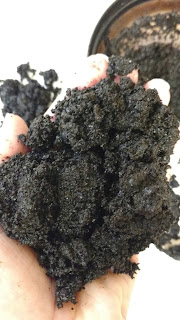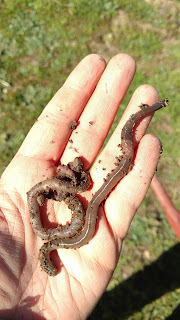We've discussed recycling and composting in the garden a few times. There are many benefits of composting not just for the garden but also for our planet!
If you drink coffee, you NEED to read this! Hey, even if you don't drink coffee, you probably know someone who does and would be willing to share their coffee grounds
Composting coffee grounds is easy! Just throw them into your compost pile or bin. Used coffee filters can be composted as well, preferably unbleached. If you add coffee grounds, this is considered "green material" so you'll need to balance with "brown material."
Coffee Grounds can be used as a fertilizer as it adds organic material to the soil. This can improve drainage and water retention. Bonus, spent coffee grounds attract earthworms!
There are many uses for Coffee Grounds in the garden.
Many gardeners like to use used coffee grounds as a mulch for their plants. Other used for coffee grounds include using it to keep slugs and snails away from plants. The theory is that the caffeine in the coffee grounds negatively affects these pests and so they avoid soil where the coffee grounds are found. Some people also claim that coffee grounds on the soil is a cat repellent and will keep cats from using your flower and veggie beds as a litter box. You can also use coffee grounds as worm food if you do vermicomposting with a worm bin. Worms are very fond of coffee grounds.
Decomposing coffee grounds have their own fungal and mold colonies and those fungal colonies tend to fight off other fungal colonies. If this seems weird, just remember that the antibiotic penicillin was developed from a mold. The world of teeny, tiny things is fighting for space and resources just as fiercely as the world of big, visible things, and you can use that to your advantage.
Disease suppression
As they decompose, coffee grounds appear to suppress some common fungal rots and wilts, including Fusarium, Pythium, and Sclerotinia species. In these studies, coffee grounds were part of a compost mix, in one case comprising as little as 0.5 percent of the material. Researchers suggest that the bacterial and fungal species normally found on decomposing coffee grounds, such as non-pathogenic Pseudomonas,Fusarium, andTrichodermaspp. and pin molds (Mucorales), prevent pathogenic fungi from establishing. A similar biocontrol effect was noted on bacterial pathogens including E. coliand Staphylococcusspp., which were reduced on ripening cheeses covered with coffee grounds.
Effects on plant growth
Given their antimicrobial activity, it’s not surprising that attempts to cultivate mushrooms in coffee grounds have been variable and species-specific. Likewise, their effects on plant growth are unpredictable. Coffee ground composts and mulches have enhanced sugar beet seed germination and improved growth and yield of cabbage and soybeans. It’s been an effective replacement for peat moss in producing anthuriums. Increases in soil nitrogen as well as general mulching benefits, such as moderating soil temperature and increasing soil water, are proposed mechanisms for these increases.
Using Coffee Grounds in the Garden
-Toss them in the compost
-Add them to your vermicompost (worm bins)
-Add directly to soil for organic matter
-Mulch with coffee grounds
-Add to you Organic liquid fertilizer
-Mix with carrot seeds to improve germination and soil aeration
There you have it! Do you use Coffee Grounds in the garden?
Sign up for our E-Newsletter





6 comments
I use them in my compost heap, filters and all. I get them from the local coffee shop and from work.
I use coffee grounds in my “ginormous” compost bin and also toss them directly into my veggie garden and back yard lawn area, depending on how much time/energy I have. (The compost bin involves unlatching/latching and then turning a huge barrel with a handle, something I only do two or three times a week.) So far, the main benefit I’ve seen is an increase in earthworms, and we all know how beneficial earthworms are.
Comments on use of coffee grounds helpful. Can crushed egg shells be helpful to use in soil prep or should you put it in a mix or not use at all?
The coffee filters can also be used in the bottom of pots to cover the holes , to prevent the soil from washing out of the holes, when 1st. transplanting plants, until they become ‘established’ in their temporary home. Just as in the coffee pot, the filter allows the water to drain out of the pot.
I found a little mom & pop drive thru coffee shop near my home. They have been saving coffee grounds for me for about three years. I bring them an empty five-gallon bucket with lid each week, and their trade it for a full one. When the garden is producing well, I sometimes share some of the bounty with them. We all win!
I started adding all the grounds to the blueberry bed as a mulch. It took a while, but when that entire bed was covered, the grounds were alternated between other garden beds and the compost heap.
Yes, the worms love it! And when used as a mulch, the cats stay away from those beds.
I hope my relationship with the coffee shop continues for a long time!
Stopping by from Happiness is Homemade. We do use coffee grounds in our compost and directly on our gardens. We’ve moved to a new place so there’s lots of places we’ll be adding compost and coffee grounds to bring back the sad condition of the gardens.